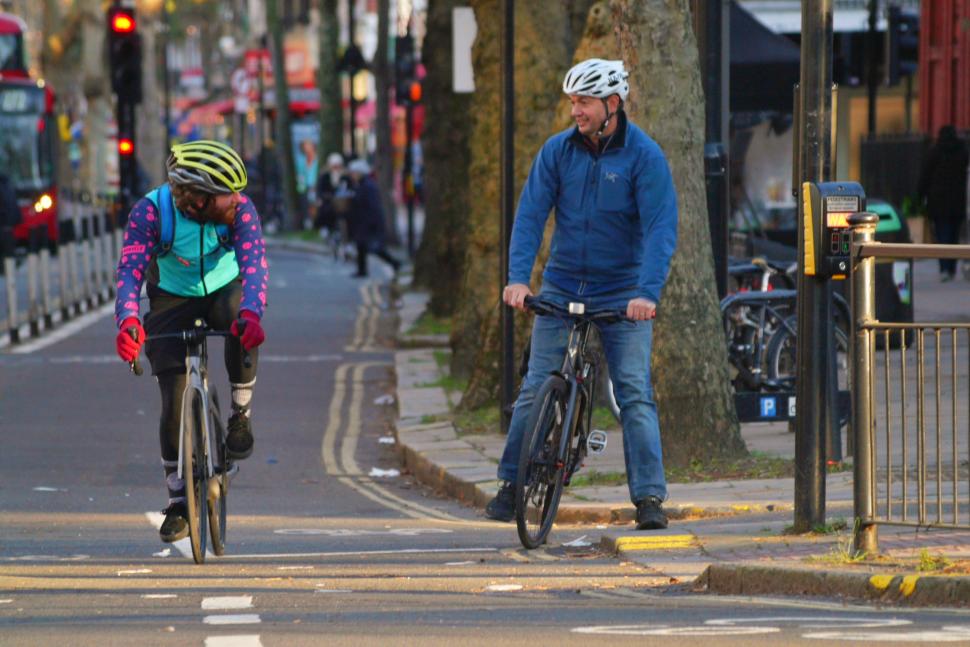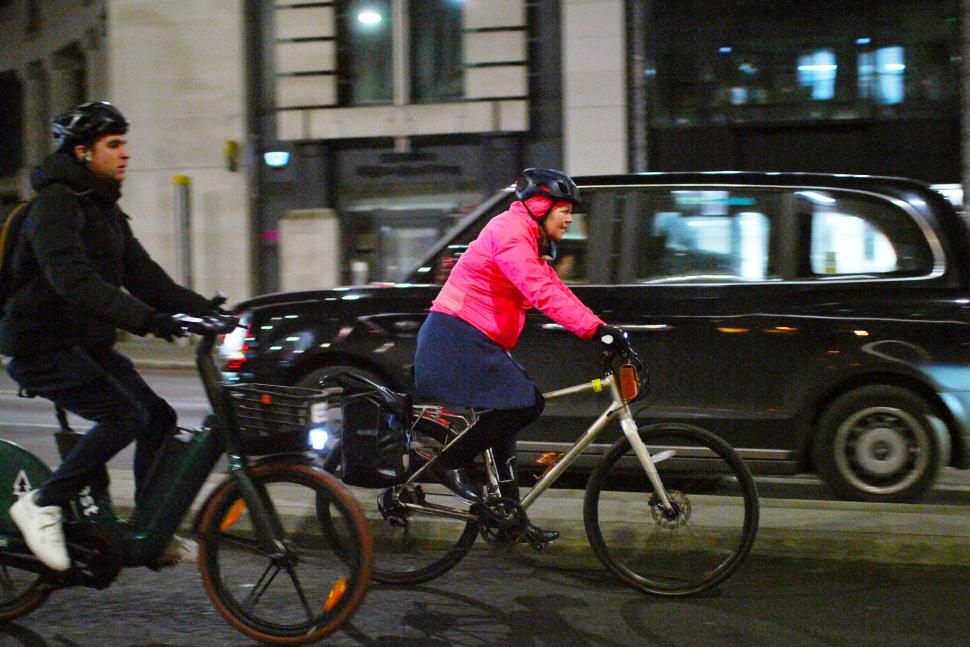- News
- Reviews
- Bikes
- Components
- Bar tape & grips
- Bottom brackets
- Brake & gear cables
- Brake & STI levers
- Brake pads & spares
- Brakes
- Cassettes & freewheels
- Chains
- Chainsets & chainrings
- Derailleurs - front
- Derailleurs - rear
- Forks
- Gear levers & shifters
- Groupsets
- Handlebars & extensions
- Headsets
- Hubs
- Inner tubes
- Pedals
- Quick releases & skewers
- Saddles
- Seatposts
- Stems
- Wheels
- Tyres
- Tubeless valves
- Accessories
- Accessories - misc
- Computer mounts
- Bags
- Bar ends
- Bike bags & cases
- Bottle cages
- Bottles
- Cameras
- Car racks
- Child seats
- Computers
- Glasses
- GPS units
- Helmets
- Lights - front
- Lights - rear
- Lights - sets
- Locks
- Mirrors
- Mudguards
- Racks
- Pumps & CO2 inflators
- Puncture kits
- Reflectives
- Smart watches
- Stands and racks
- Trailers
- Clothing
- Health, fitness and nutrition
- Tools and workshop
- Miscellaneous
- Buyers Guides
- Features
- Forum
- Recommends
- Podcast
news
 Cyclists in London talking in cycle lane
Cyclists in London talking in cycle lane Government knew it wasn't investing enough in cycling, according to new document
At the end of a week when the Institute for Public Policy Research (IPPR) warned that "the UK is travelling in the wrong direction" after official figures showed a 7.3 per cent decline in cycling miles travelled and a 2.2 per cent rise in car journeys between 2022 and 2023, a newly available document shows that the Department for Transport knew it was not investing enough in active travel to hit its targets.
The 'Insights from investment modelling' has been made available on the government website, the report initially produced in 2019 aims to understand how much additional investment would be needed to achieve the initial 'Cycling and walking investment strategy' targets for 2025.
It's taken four years & a High Court challenge by @TransportActio2 to get this doc made public!
Today @transportgovuk finally published modelling, showing it knew all along it wasn't investing enough in active travel. 🧵 1/ pic.twitter.com/0yScLaJ2qa
— Rafe Smyth (@safemyth) May 24, 2024
The document explains that the modelling suggests "some £5-8 billion of further investment across the economy (not solely using funds from central Government) is required to reach the cycling aim of 1.6 billion cycle stages".
In the summer of 2022, the Department for Transport said it would invest £3.78bn in active travel schemes until 2025 as part of its refreshed cycling and walking investment strategy. In March of the following year, Chancellor Jeremy Hunt slashed the budget for active travel schemes, a widely criticised move that the Walking & Cycling Alliance called a "backwards step" and one that would make it "impossible" to hit Net Zero and active travel targets.
Transport Action Network (TAN) is challenging the cuts in the High Court, and hours before Mr Justice Jay's decision to permit the challenge, lawyers acting for the department were forced to disclose slides which highlighted how the cuts would "devastate" sustainable travel in most of England's local transport authorities outside of London.
And the latest document to be revealed, the aforementioned 'Insights from investment modelling', also shows that the Department for Transport was aware that "Benefit cost ratio (BCRs) for the cycling central scenarios are in the range 2.0 to 3.1, implying high value for money".
"Packages of interventions in areas with a high intrinsic cycling potential have BCRs over 5. Value for money of investment in walking to school is expected to be at least High," the government was told.
The report also states that the investment required could be lower, in the region of £3.4 billion and £5.4 billion, if "cycling investment is combined with strong traffic restraint", such as parking restrictions.
"In two 'higher cost' scenarios in which all investment is in infrastructure (without accompanying revenue investment in behaviour change interventions to maximise take-up of new infrastructure) the additional investment to reach 1.6 billion stages is more than £10 billion," it continued.
The government's attitude to active travel investment has been criticised at length in recent times, the IPPR last month slamming the "shocking lack of progress", while Cycling UK has also warned of "chronic underfunding".
In September, the cycling charity blamed the "depressing" decrease in cycling traffic on the government's cuts to the active travel budget.
The ongoing legal challenge has also led to papers being obtained which revealed how "a crackpot conspiracy theory" that misrepresented the urban planning concept of the 15-minute city led to the government slashing funding for active travel and pledge to review measures aimed at curbing the use of private motor vehicles.
Instead, much of the government's messaging has been around ending the so-called war on motorists, Rishi Sunak unveiling a 'Plan for Motorists' at the Conservative Party conference last autumn, an approach which is expected to reemerge during the run up to the general election on July 4.
Six of the UK's leading active travel groups, including the CEOs of Cycling UK, British Cycling, Bikeability Trust, Living Streets, Ramblers, and Sustrans, reacted to the 'Plan for Motorists' by warning that the Prime Minister would deny citizens "their choice, health, and freedom".
Dan is the road.cc news editor and joined in 2020 having previously written about nearly every other sport under the sun for the Express, and the weird and wonderful world of non-league football for The Non-League Paper. Dan has been at road.cc for four years and mainly writes news and tech articles as well as the occasional feature. He has hopefully kept you entertained on the live blog too.
Never fast enough to take things on the bike too seriously, when he's not working you'll find him exploring the south of England by two wheels at a leisurely weekend pace, or enjoying his favourite Scottish roads when visiting family. Sometimes he'll even load up the bags and ride up the whole way, he's a bit strange like that.
Latest Comments
- mdavidford 2 sec ago
Never mind that. More importantly, since when does a bike lock qualify as a 'tool'?
- wtjs 3 min 33 sec ago
there are far more decent Audi drivers then those who give that brand it's current appalling reputation for bad driving...
- Rendel Harris 6 min 34 sec ago
I'm quite happy, indeed I would be delighted, to be proved wrong, but I have never seen a careless driving close pass where the conviction has...
- mdavidford 16 min 36 sec ago
And trains. And protesting farmers.
- Eurodolphin 44 min 50 sec ago
Having experienced a brain injury (while my helmet only suffered a little crack) I welcome all this excellent research which looks for ways to...
- mattw 47 min 42 sec ago
Nope. Has anyone ever bought a wheel trim studded with diamonds for their car? Thought not.
- the little onion 58 min 2 sec ago
10/10 for the use of the word "wankpanzer". I look forwards to hearing it on Radio 2....
- David9694 1 hour 10 min ago
Dad of William Brown Jr battles Folkestone Town Council over illuminated sign featuring late son’s picture...
- Disgusted of Tunbridge Wells 2 hours 17 min ago
All ebikes are equal... But folding ebikes are more equal than others?...
- chrisonabike 2 hours 39 min ago
(Agreeing with your drift, but...) I'm sure they do put some people off, but I bet that's not what puts most people off! Because most people (as...

Add new comment
14 comments
You could swap "cycling" out of that headline and replace it with pretty much anything and it would probably be accurate
I look forward to this being thoroughly
analysed and discussedignored in the election campaign.Investing in active travel is the best value the government could get, but nobody will mention it.
I agree it won't be front and centre of anyone's campaign, but it will have to feature in the parties' manifestos.
We'll be able to read the manifestos and get a good impression of who is most ambitious on active travel.
You think so? I disagree, but I hope you're right.
This country has mostly been designed around using a car, this mode of living has to stop - it's very destructive and not sustainable.
You don't say?
Great work by Transport Action Network (TAN). The idea that active travel can possibly be something this government was supporting is a nonsense when you see what their plan for drivers meant - preventing local authorities from enforcing speed limits and LTNs by blocking access to DVLA data.
There seem to be an awful lot of instances of the government being "forced to disclose" something by the courts, and then only after a lot of expensive legal resistance funded with public money. I thought democracy meant the government was supposed to work for the people based on open information and argument for the public good. Surely I haven't been hopelessly naive!
I couldn't possibly say.
You were naive only insofar as you equated the Mr Sunak's rabble with a government.
I don't think "democracy" has moved that far from its origins (when "the people" who were ruling didn't include e.g. the poorer / landless, foreigners, slaves or even women...)
Isn't the point to limit the tyranny of those in power and (hopefully) provide a balance of stability and change by a) making them compete against each other and b) providing for a periodic renewal, judged by the populace?
In return for "playing along" the rulers still get a substantial range of perks, plus the reassurance that "who rides the tiger can dismount" in this case.
In the modern UK formulation there are lots of other feedback loops of course (the State is pretty big) but I'm not sure any of that "work for the people" stuff is the main part of it. Hopefully some of that emerges as a secondary product...
Along the lines of that Churchill quote:
They're the party of the motorist, not the party of the people
With all things involving government it's normally worth reversing the situation applying the policy or action to something that you like or a person you love.
Constructive ambiguity and framing policy in an oblique manner is also part of getting things done that you might like.
Full transparency of intentions and direction of travel often has the effect of turning what would be passive acceptance into outright opposition.
A good example of it would be legalising homosexuality that wasn't done by advocacy for people's rights but by equating it to adultery, unsavoury but not illegal. See overton window.
That's not the case at all, the primary driver for the legalisation of homosexuality in the UK was the Wolfenden report which stated: "homosexual behaviour between consenting adults in private should no longer be a criminal offence [because] homosexuality cannot legitimately be regarded as a disease, because in many cases it is the only symptom and is compatible with full mental health in other respects."
Quite willing to stand corrected but I have never heard the reason you advance mentioned anywhere.